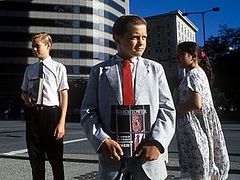Strasbourg, June 9, 2022
The European Court of Human Rights (ECHR) regards Russia’s ban on Jehovah’s Witnesses as a violation of the Convention on Human Rights, reports Interfax Religion. The Jehovah’s Witnesses is banned in the Russian Federation as an extremist organization.
The Strasbourg Court has decided on 20 combined complaints of 1,444 applicants—organizations, individual participants of “Jehovah's Witnesses”—and found a violation on the part of the authorities of the Russian Federation against the defendants, including in connection with the liquidation of the “Management Center of Jehovah's Witnesses”, Article 9 of the European Convention for the Protection of Human Rights (freedom of thought, conscience and religion), articles 10 (freedom of expression), articles 11 (freedom of assembly).
A violation of article 5 of the Convention (right to personal integrity) was also found.
"The court ruled (...) that Russia must take all necessary measures to stop the criminal prosecution of Jehovah's Witnesses and release those who are in custody," the ECHR said in a statement.
On April 6, 2017, the Supreme Court of Russia began considering the merits of the claim of the Ministry of Justice of the Russian Federation on the recognition of the “Management Center of Jehovah’s Witnesses in Russia” as an extremist organization. The representative of the Ministry named the reasons why the agency demands to liquidate the organization and ban its activities on the territory of the country, according to a news article from that year on BFM.ru.
Around the same time, when members of the Jehovah's Witnesses were packing the Russian Supreme Court with claims of political repression, they were not recognized as subject to such repression.
The main claims by the Russian Ministry of Justices against the Jehovah’s Witnesses are the refusal of blood transfusion and the distribution of prohibited literature. The first, according to the Ministry of Justice, violates the right of citizens to unhindered medical care, the second poses a threat to the security of the country.
Citing oral explanations on her claim in the Supreme Court of Russia, the representative of the Ministry Svetlana Borisova said that the lawsuit asking for a ban on the central organization of Jehovah's Witnesses was filed in order to “strengthen the rule of law and prevent violations of the interests of public order and security, as well as to prevent extremist activities.” She noted that the ban on blood transfusions professed by Jehovah's Witnesses would create a threat to human life and health in some cases.
The representative of the Ministry of Justice noted that this conclusion was reached back in 1999 by a religious studies examination of the Watchtower magazine. Subsequently, the magazine was recognized as extremist literature and banned.
Precedents included a St. Petersburg court order to a local hospital to give an eight-year-old girl a needed blood transfusion. The girl’s father, a Jehovah’s Witness, was obstructing the doctors from administering the transfusion.
The Strasbourg Court, however, concluded that “the definition of ‘extremism’ was excessively broad in Russian legislation and was improperly used to persecute believers or religious ministers solely on the basis of their beliefs."
The court also ordered various payments to the applicants: 15 thousand euros for each person who was prosecuted, 7.5 thousand for those who came under administrative prosecution, as well as liquidated organizations and communities, at least 1,000 euros for the rest of the applicants as compensation for moral damage—a total of more than 3 million euros.
In addition, the ECHR decision notes that the respondent state must pay 125 thousand euros to all applicants in connection with court costs.
The court also decided that the seized property must be returned to the applicants, and in case of non-return to pay the amounts determined by the decision within three months from the date of its entry into force.
The RF State Duma has adopted a law according to which the decisions of the ECHR made after March 15, 2022—that is, after the termination of the powers of the Russian Federation in the Council of Europe—are not enforceable in Russia. Therefore, the Russian Federation will not be enforcing the ECHR’s ruling.
Follow OrthoChristian on Twitter, Vkontakte, Telegram, WhatsApp, MeWe, and Gab!





